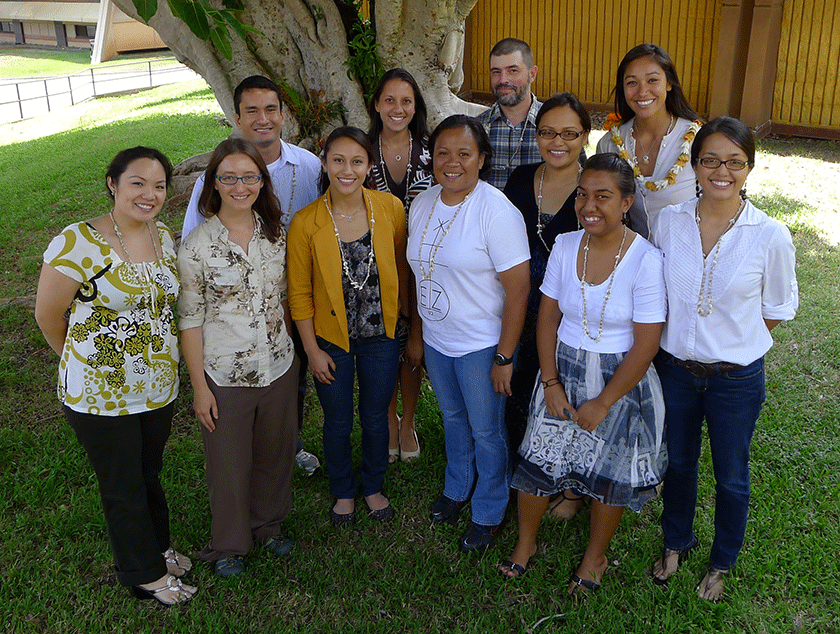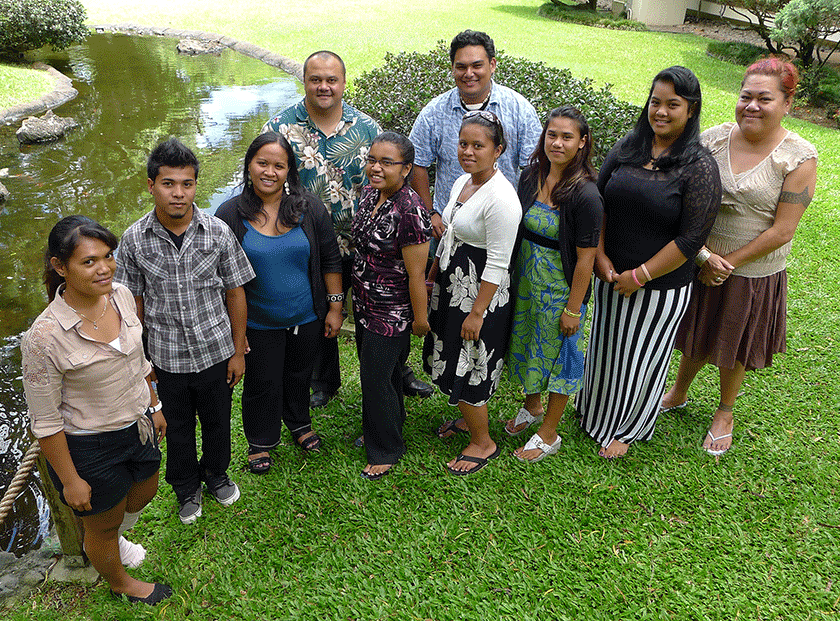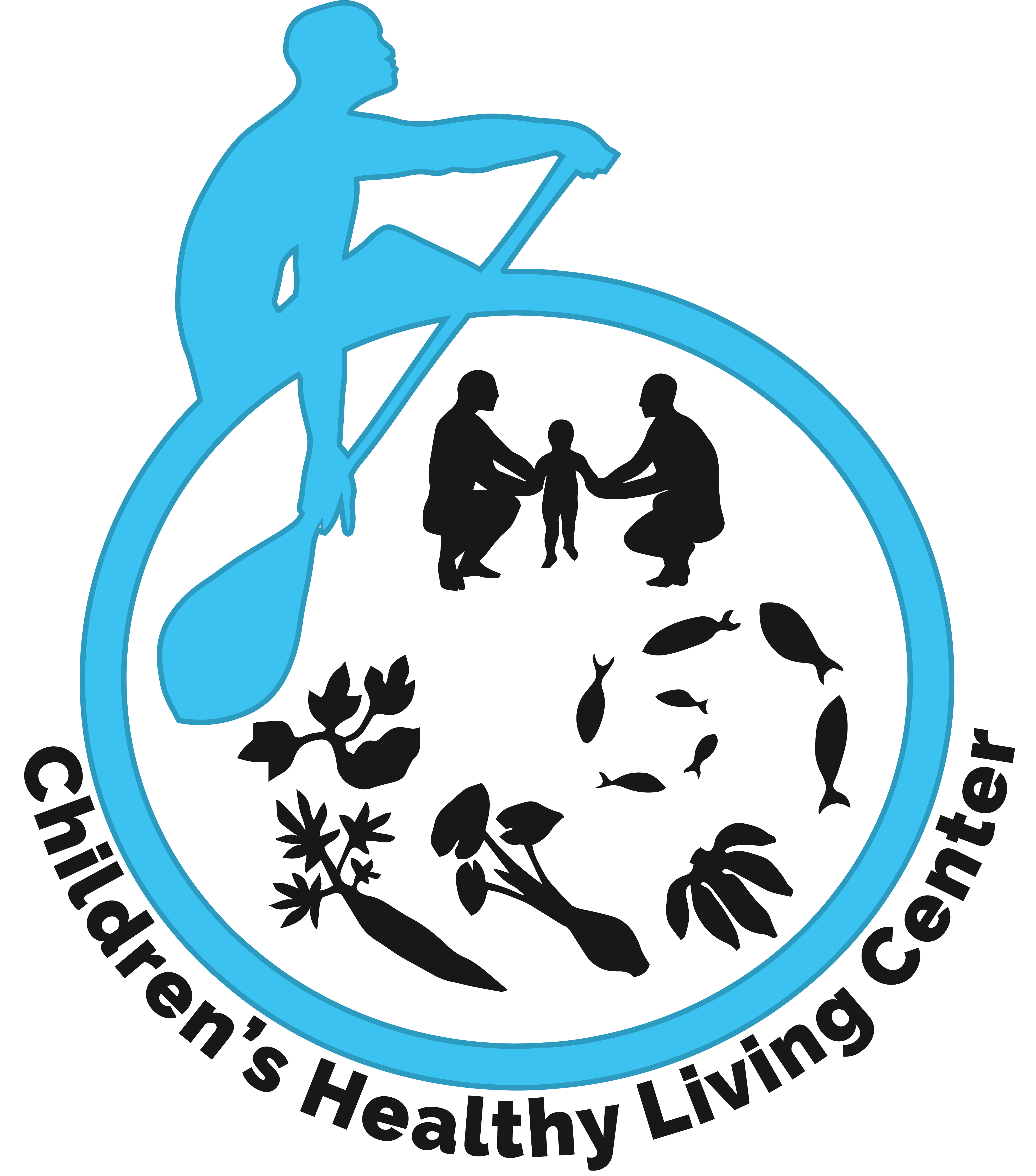We are pleased to announce the successful conclusion of the Original CHL Training Program. This program was driven by two primary objectives:
- Scholarship: The program set out to train 22 current and future professionals and paraprofessionals in food, nutrition and public health, and in research and evaluation methods at various levels of need in the region, in order to maintain healthy weight and prevent young child obesity
- Capacity Building: By developing future professionals in the region, CHL is working toward long term sustainability and to develop culturally appropriate nutrition courses and programs within existing academic institutions in the region.

Back row (L-R): Caleb Scanlan (American Samoa, withdrawn), Tanisha Ann Aflague (Guam), Ron Standlee-Strom (Alaska), Rose Castro (CNMI), Monica Esquivel (Hawai‘i).

Back row (L-R): Aifili Tufa (American Samoa), Joachim Castro (Chuuk)
Not shown: Samuel Foulchag (Yap), Shra Kedi (Majuro), Tara Stiller (Alaska)
Requirements
Each CHL trainee must meet the CHL Training Program Requirements described below in addition to all degree-program requirements of the institution in which the degree program is housed.
Key Personnel in the CHL Training Program and their Roles
CHL Lead Site Co-Investigator (Co-I). Each Jurisdiction has a Lead Site Co-I (listed below). Roles: Chairs the Jurisdiction’s Admissions Committee and defines residency requirements for applicants from their jurisdiction; may be asked to serve on the CHL Trainee Admissions Committee if their jurisdiction does not have a CHL Coordinator to serve; appoints CHL Coordinators for degree programs in their jurisdiction, and upon recommendation from the CHL Trainee Evaluation Committee can dismiss students from the CHL Training Program who are in degree programs within their jurisdiction.
CHL Coordinator. Each degree program has a CHL Coordinator (listed below). The CHL Coordinators are appointed by the Lead Site Co-I. Roles: Oversees the development and implementation of the CHL Training Program within their degree program(s); serves on the CHL Trainee Admissions Committee; and serves on the CHL Trainee Evaluation Committee for all trainees in their degree program(s).
CHL Faculty Advisor. Each CHL trainee will have a CHL Faculty Advisor associated with the degree program they are in. The CHL Faculty Advisor is appointed by the CHL Admissions Committee. A trainee may request to be reassigned to a different CHL Faculty Advisor at any time. The trainee should first discuss the reassignment with the CHL Education Coordinator (Dr. Jody Leslie) who will aid the student in the process of finding a new advisor. Roles: Responsible for guiding the progress of the trainee with respect to meeting all CHL Training Program requirements including the CHL project, outreach, and seminar. This role is done in cooperation with any advisor or committee required by the degree program. The CHL Faculty Advisor also serves on the CHL Trainee Evaluation Committee for their trainee.
CHL Education Coordinator. Organizes and teaches the CHL Seminar distance-education course; leads the production and dissemination of distance-education materials developed for CHL training purposes; and serves on the CHL Trainee Evaluation Committee.
Key Committees in the CHL Training Program
Jurisdiction Admissions Committee. This committee is chaired and organized by the jurisdiction’s Lead Site Co-I. Roles: Advertises the CHL Training Program in their jurisdiction; corresponds with potential applicants; accepts applications from candidates in their jurisdiction by December 31st; reviews all applications and conducts applicant interviews; ranks all applicants based on the CHL selection criterion; and forwards all ranked applications to the CHL Admissions Committee by January 17, 2012.
CHL Trainee Admissions Committee. Members include the CHL Coordinators for each degree program and, if a jurisdiction does not have a CHL Coordinator to serve, the Lead Site Co-I for that jurisdiction. Roles: Reviews all applications received from the Jurisdiction Admission Committees and conducts applicant interviews; ranks applicants within each degree program; decides by January 30th which applicants are qualified for potential admission into the CHL Training Program and notifies all applicants of their status; by April 30th makes the final decision on which applicants are admitted into the CHL Training Program based on their ranking of applicants which have been accepted into a degree program. Only 2 applicants from each jurisdiction will be admitted into the CHL Training Program.
CHL Trainee Evaluation Committee. Chaired by the CHL Education Coordinator and includes the CHL Coordinator for the degree program the trainee is in, and the trainee’s CHL Faculty Advisor. In the case where the CHL Coordinator and CHL Faculty Advisor are the same person, the trainee’s Lead Site Co-I will serve on the committee. Roles: Tracks and evaluates the progress of the CHL trainee; meets semiannually (December and May) with the student, discusses and evaluates the student’s performance and, if needed, recommends ways that the trainee could improve; may recommend to the Lead Site Co-I that a student be dropped from the program.
CHL Training Program Requirements
a) Training must be done within a CHL-approved degree program with the goal of producing graduates who can assist with the goals of CHL (preventing childhood obesity) in their home jurisdiction. All trainees should develop their degree programs with this goal in mind and must take, or have taken, at least one course in basic/introductory nutrition.
b) All trainees will be supervised by at least one CHL Faculty Advisor from the CHL program in cooperation with any advisor or committee required by the degree program. The CHL Faculty Advisor, in most cases, will be a faculty member of, or closely associated with, the degree program the student is enrolled in. The CHL Faculty Advisor is responsible for guiding and evaluating the progress of the trainee with respect to meeting CHL training requirements. The trainee’s CHL Faculty Advisor will be assigned by the CHL Trainee Admissions Committee as part of the admission process. Trainees may request to be reassigned to a new advisor as described above under Key Personnel, CHL Faculty Advisor.
c) A CHL-related project must be a part of the degree program. This project may be part of a 1-3 semester independent study/internship at the undergraduate level, or part of a MS thesis, MPH project, or doctoral dissertation. The project will be guided by the student’s CHL Faculty Advisor in cooperation with any advisor or committee required by the degree program. The project must include a culminating experience that includes a written and oral presentation of the project to the CHL Faculty Advisor and any committees required by the degree program. The project is not necessarily part of the CHL intervention, per se, but it could be. Use of CHL methodology when measuring diet, physical activity, obesity, etc. will be expected as they relate to the developed projects.
d) Trainees should give feedback/outreach to the community/jurisdiction they are being trained in, or are from. This feedback can be based on, or be part of, their academic training and/or their CHL-related project. This feedback/outreach will be guided by the student’s CHL Faculty Advisor in cooperation with any advisor or committee required by the degree program. The feedback may or may not be part of the dissemination of the CHL intervention. The feedback should begin while the student is still in training and continue in their home jurisdiction after they graduate for a minimum of one year. A goal of the CHL training program is that graduates become employed in their home jurisdiction in positions that will foster the prevention of childhood obesity. The feedback/outreach will likely incorporate appropriate policy advocacy in alignment with findings. The trainee must agree to, and demonstrate commitment to, this outreach/feedback requirement in order to be admitted, and must remain in good standing, in the CHL Training Program.
e) All trainees will be required to participate in the CHL Seminar course. The intent of the CHL Seminar is to provide a venue for expanded training and skill building in the area of childhood obesity prevention beyond what may be available in the student’s degree program. The course will develop a common set of CHL-related educational objectives, skills, and materials among all trainees. The seminar course is also a venue for CHL trainees to interact with each other to develop a Pacific Child Obesity Prevention Team that will plan how their training and career paths can promote the CHL objectives.
The CHL Seminar will be a distance education course organized and taught by the CHL Education Coordinator. The seminar will be a variable credit course (e. g. 1-3 credits depending on the level of the student and their course load). The course will be taught once a week for 1-2 hours every semester. Trainees will be required to register for the seminar every semester they are in the CHL program. The CHL Seminar is expected to be offered as a distance education course from the University of Hawaii Outreach College. Students in institutions outside the UH system can register for the course and transfer the credits to their home institution. Alternatively, they may be able to register for a seminar, independent study, or other appropriate course in their own institution that would be a placeholder for the distance CHL seminar. In this case, the student’s CHL Faculty Advisor would assign them their CHL seminar grade each semester based on the grade given by the CHL Seminar instructor.
Selection Process and Criteria
Selection Process and Criteria for Admission into the CHL Training Program
Applicants must apply to, or be currently enrolled in, a CHL-approved degree program to be eligible for admission into the CHL Training Program. Since the CHL Training Program is conducted within existing degree programs, applicants must meet all the admissions requirements of the degree program to which they are applying, as well as additional admission criteria imposed by CHL (described below).
The CHL Training Program is accepting applicants for Fall 2012 admission. Admission may continue in Fall 2013 for candidates applying to degree programs that typically take less than 4 years to complete.
CHL Training Program Admission Criteria
Applicants should be a resident of a jurisdiction included in CHL (i.e., Alaska, Hawaii, Guam, American Samoa, Commonwealth of the Northern Mariana Islands, Republic of the Marshall Islands, Republic of Palau, and the Federated States of Micronesia) and must be a US citizen, US National, US green-card holder, or a citizen of the Federated States of Micronesia, the Republic of the Marshall Islands, or the Republic of Palau. Residency will be assessed by the jurisdiction Lead Site Co-Investigator (i.e. each Lead Site Co-I will determine residency requirements for applicants in their jurisdiction). Students who are indigenous/native to the jurisdictions noted above are encouraged to apply.
Applicants who are not current residents of a CHL jurisdiction will be considered when it can be demonstrated that upon graduation the applicant intends to reside and work within a CHL jurisdiction named above.
Questions about residency should be addressed to the jurisdiction Lead Site Co-Investigator to which the CHL Training Program application will be sent.
When appropriate to their degree/career objective, the applicant should apply to a degree program within their home jurisdiction. Otherwise, if supported by their jurisdiction’s Lead Site Co-I, they may apply to a degree program in another jurisdiction.
The CHL selection criterion will include an evaluation of the applicant’s potential to:
- Succeed academically in the degree program to which they applied.
- Excel in their CHL-related project.
- Interact and communicate effectively with other trainees in the CHL Seminar course using distance-education techniques.
- Provide feedback and outreach to their jurisdiction in both the short-term and after graduation to support the goals of CHL (i.e. commitment and potential of the applicant to work in their jurisdiction in an obesity prevention capacity after training).
Evaluation of the applicant will be based on materials presented in the degree-program application, CHL application, letters of recommendation, and by personal interviews with the applicant.
Selection Process for Admission into the CHL Training Program
Step 1. All applicants must first be ranked by the jurisdiction Lead Site Co-I based on the above criteria. Therefore, the initial application step is review at the jurisdiction level. Applications to the CHL Training Program are due to the Lead Site Co-I by December 31, 2011. The Lead Site Co-I forwards all applications to the CHL Admissions Committee by January 17th, 2012.
Step 2. The CHL Trainee Admissions Committee will decide by January 30, 2012 which applicants are qualified for potential admission into the CHL Training Program and may go on to Step 3. The composition of the CHL Trainee Admissions Committee will include the coordinators for each CHL degree program, and, if a jurisdiction does not have a degree program coordinator on the committee, the Lead Site Co-I for that jurisdiction. There is no limit to the number of applicants that can go to Step 3.
Step 3. Applicants qualified in Step 2 submit (or have already submitted) their degree-program applications to the CHL-approved College or University degree-granting program. The admissions office or committee of the degree-granting institution will decide if the applicant is admissible into their degree program. The applicant notifies the CHL Trainee Admissions Committee of their acceptance or denial by the College or University degree program.
Step 4. The CHL Trainee Admissions Committee makes final decisions on admissions into the CHL Training Program. Only 2 (two) applicants from each jurisdiction will be admitted into the CHL Training Program. This decision is based on the ranking of all CHL applicants from a jurisdiction which have been accepted into a degree program. Final decisions will be made by April 30th.
Evaluation/Assessment of CHL Trainees
Evaluation of CHL trainees will be conducted by a CHL Trainee Evaluation Committee specific for each student. The student’s evaluation committee will be chaired by the CHL Education Coordinator and include the CHL Coordinator for the degree program the trainee is in, and the trainee’s CHL Faculty Advisor. In the case where the CHL Coordinator and CHL Faculty Advisor are the same person, the trainee’s Lead Site Co-I will serve on the committee. The purpose of the committee is to track and evaluate the progress of the CHL trainee. This committee will have the responsibility of meeting with the student, discussing and evaluating the student’s performance and, if needed, recommending ways that the trainee could improve. If the committee finds the trainee is not making satisfactory and timely progress, they can recommend to the Lead Site Co-I that the student be dropped from the program. The Lead site Co-I of the jurisdiction in which the degree program is located makes the final decision about dismissal from the CHL Training Program. Evaluations and recommendations will be conducted semiannually (December and May).
Jurisdiction Lead Site Co-Investigators
American Samoa
Aufa’i Apulu Ropeti Areta, MS
Alaska
Andrea Bersamin, PhD
University of Alaska Fairbanks – Center for Alaska Native Health Research
Commonwealth of the Northern Mariana Islands (CNMI)
Jang Ho Kim, PhD
Northern Marianas College
Freely Associated States (FAS) of Micronesia
Jonathan Deenik, PhD
University of Hawaii at Manoa
Guam
Rachael Leon-Guerrero, PhD, RD
University of Guam Station
Hawaii
Rachel Novotny, PhD, RD
CHL Principal Investigator and Program Director
University of Hawaiʻi at Mānoa
CHL Coordinators for Degree Programs
University of Guam
BS in Health Sciences: Yvette Paulino, PhD
BSN in Nursing: Margaret Hattori-Uchima, RN, MSN
University of Hawaiʻi at Mānoa
BS in Health Sciences: Yvette Paulino, PhD
BSN in Nursing: Margaret Hattori-Uchima, RN, MSN
University of Hawaiʻi Community Colleges
AS in Exercise and Sports Science: Ron Takahashi.
Nursing Pathway, Certified Nurse Aide (CNA) to Registered Nurse (RN): Jamie Boyd, PhD, RN.
University of Alaska
Graduate Interdisciplinary Studies (MA, MS, PhD), PhD in Natural Resources and Sustainability, MS in Natural Resources Management, Master’s in Natural Resource Management and Geography: Joshua Greenberg, PhD.
Associates Degree in Rural Nutrition Services. Bret Luick, PhD.
Master of Public Health (MPH) distance education program. Rhonda Johnson, Dr PH.
